Photos by Anjuli Persaud and Frances Abraham
Liverpool on the Corentyne coast is situated about 18 miles from New Amsterdam, and consists of 450 homes with about 1,000 persons, the largest proportion of whom are African-Guyanese. Residents share good relations with the neighbouring villages of Lancaster and Manchester, to which they are required to travel for health care and other community needs.
While it might be thought that many persons would have given up field work as their form of livelihood, this is not true of the residents of Liverpool, many of whom still work in the fields, whether it is to cut sugarcane or harvest rice. Being able to provide these basic necessities for Guyanese, they say, makes the job worth it.
“Most people around here depend on GuySuCo or the rice industry to make a living. Some of them, that’s all they know… Never went to Georgetown and work in office so they enjoy life in the countryside, it’s simple,” Joseph Alleyne, a retired policeman who worked in the capital for many years but returned home some years ago, said.
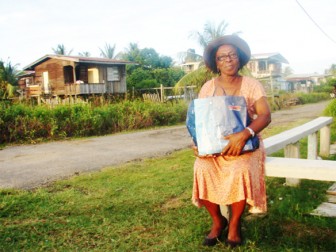
He pointed out that not everyone is employed as a cane-cutter or rice farmer, but that many residents have opted to venture into business on their own, whether it be farming on a small scale to fulfil their own needs, or a small retail concern, or, which is more popular, into animal rearing.
“Many people got their own livestock, you know, goat, sheep, cows and pigs,” a friendly Alleyne said as he sat in his yard on a wooden staircase. He went on to describe what a nice village Liverpool was – and peaceful too, which is probably why he chose to spend his retirement years here.

Several residents told Sunday Stabroek that they don’t buy coconuts or fruit, or even vegetables. Most people grow this kind of produce in their own back yards, and if they have a surplus it is either exchanged for a food item they don’t have, or else is shared with others.
To outside eyes the village appears very traditional, with houses at the back built in the old wooden style with shingles. The residents this newspaper encountered were undertaking their chores too in the old-fashioned way, with little evidence of modern conveniences. There is not a great deal of commercial activity to be seen, although there are some shops selling a variety of items.
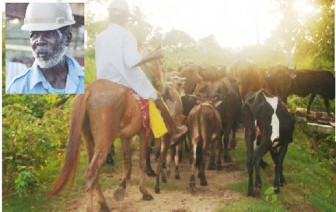
Alleyne’s neighbour, Hetty Sears, better known as ‘Cousin Hetty’, has been living in Liverpool since her childhood days and now she is a senior citizen, she says she can definitely see the many ways in which the village has been transformed.
“Now you get good dam and so because long ago we didn’t have roads. We had mud and you had to walk through the savanna… The place develop very much over the years,” Cousin Hetty said when Sunday Stabroek caught up with her briefly in front of her home.
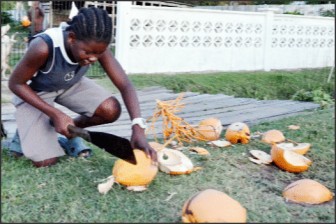
The woman said over the years she had seen many of Liverpool’s residents moving to greener pastures, but those who stayed definitely made the community a better place, enhancing its physical appearance with nicer
homes. She added that though many persons are not fortunate enough to build themselves mansions, people try their best to keep their surroundings clean and not allow their property to become an eyesore.

When asked about what residents enjoyed doing during their leisure time, Cousin Hetty stated that she only knew of persons farming and planting rice, and only occasionally would they head over to the Hogstye Manchester Community Centre to enjoy sports and games in the sun. “Especially on August Monday, they would go over there to the ground and picnic and play games and just have fun,” she noted, explaining that since she was a little girl she knew of this day being celebrated throughout Liverpool.
However, there is a bar in the village, which Sunday Stabroek was told was well patronized. At the time this newspaper was there around 6 pm,
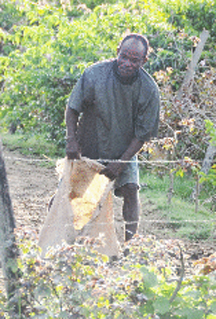
children aged around nine or ten could be seen playing pool. Some residents said there was a problem with alcohol abuse in the community and to a much lesser extent drug abuse, because young people had nothing much to do in the form of recreation. An NGO has set up a programme for drug abusers on the main road at the front of the village, but it is intended to serve all the communities around, and not specifically Liverpool.
Meanwhile, as Norma Cummings returned home from shopping at the market, this newspaper managed to catch up with her and ask about her perspectives on Liverpool. A teacher of differently-abled students, she said the special school where she worked is located in Port Mourant and only few students from her village attend the institute. However, she explained that the school has been closed but is expected to reopen in the near future.
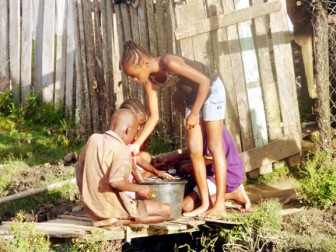
The woman said her only complaint after spending most of her years in Liverpool would be a drainage issue which residents experience during the rainy season. “Whenever it rains my entire yard is flood and people can’t go to work, children can’t go to school… it is very bad here,” she said. Apart from this, Cummings said that the area is very quiet and has peaceful residents amongst whom she enjoys living.
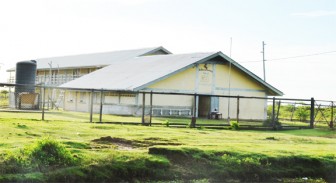
A further complaint of residents is the heavily discoloured water, and this newspaper was told that rainwater was collected as a consequence for drinking, cooking and bathing purposes. They said they did not even put the water on their plants, and used trench water instead for that.
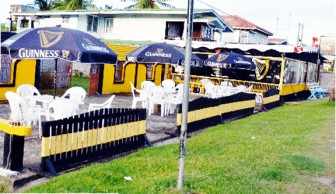
The secondary school for the general area is located in the village, but parents have to take their nursery and primary level children to the schools in Manchester, which is not far away.

Asked about the religious faiths in the community, villagers said that the neigh-bourhood was predominantly Christian, with one church situated at the end of a cross street at the back of the village.





